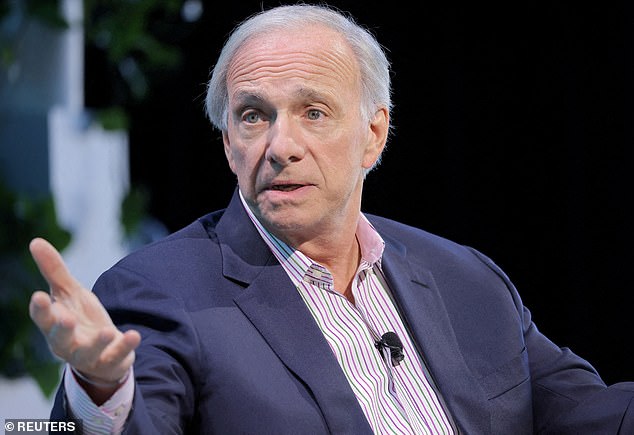The US economy is facing a ‘heart attack’ due to Donald Trump’s spending plans, a leading hedge fund manager has warned.
Ray Dalio, the founder of asset manager Bridgewater Associates, said the US President’s plan to cut taxes while ramping up government spending would trigger a financial meltdown and push American debt to unsustainable levels.
‘When the economy, and this heart attack of sorts, comes along, then you’re going to find that the voters are not going to be very happy,’ Dalio told Bloomberg.
He added that the situation would be ‘very much like the 1970s, which was very much like the 1930s’.
Dalio was referring to the period of low growth and inflation, dubbed ‘stagflation’, which gripped the US economy in the 1970s and the Great Depression of the 1930s that followed the Wall Street Crash of 1929.
The hedge fund manager – a critic of Trump – predicted that as a result, the US would face a major economic crisis in the next ‘three years, give or take a year’.

Warning: Ray Dalio (pictured), founder of asset manager Bridgewater Associates, said Trump’s plan to cut taxes while ramping up spending would trigger a meltdown

Payden & Rygel analysis suggests Doge’s painful cuts are barely making a dent on the US deficit
Doge: ‘Talk is cheap’
In the event of such as crisis, Dalio said he would expect to see real interest rates rise, even as the Federal Reserve eases monetary policy.
This will drive the value of the dollar and all other currencies down, he added, particularly in relation to gold, leaving consumers looking for alternative sources of value.
Dalio said: ‘There’s a solution here, there’s a right thing to do
‘You can lower the deficit to 3 per cent of GDP. When Trump’s tax cuts come in the projected deficit will be about 7.5 per cent of GDP.
‘Three per cent will mean debts won’t rise relative to incomes and it will greater improve the supply/demand.’
It comes as the Trump administration makes a show of its budget-slashing efforts masterminded by Elon Musk and his ‘Department of Government Efficiency’ – or Doge.
Doge’s efforts so far have created great controversy and protests from Federal employees.
But analysis from the economics team at Payden & Rygel last week suggests the department is having very little impact on the US deficit.
Analysts wrote in a note: ‘Talk is cheap, and Doge’s actual economic impact might be more muted than investors think for several important reasons.
‘First, the actual pace of Federal spending hasn’t slowed at all. In fact, at its current pace, nominal Federal spending is on track to top $6 trillion for the sixth consecutive fiscal year in 2025
‘Second, real government spending cuts are rare.
‘Third, discretionary spending totaled $1.8 trillion in fiscal year 2024, accounting for only 14 per cent of annual government expenditures. Thus, it is difficult politically to make substantial cuts
‘Fourth, Congress—not DOGE nor the President—determines spending. Executive orders are not a durable method for changing the US fiscal situation.’
The House of Representatives last week passed the US budget bill, which outlined $2trillion of cuts over the next decade,
But the bill, which must also pass the Senate, also proposes a $300billion increase in military spending and $4.5trillion in forgone revenue from the tax cuts proposed.
Payden & Rygels said this will actually lead to ‘larger budget deficits and a bigger debt-to-GDP ratio’.

DIY INVESTING PLATFORMS

AJ Bell

AJ Bell
Easy investing and ready-made portfolios

Hargreaves Lansdown

Hargreaves Lansdown
Free fund dealing and investment ideas

interactive investor

interactive investor
Flat-fee investing from £4.99 per month

Saxo

Saxo
Get £200 back in trading fees
Trading 212
Trading 212
Free dealing and no account fee
Affiliate links: If you take out a product This is Money may earn a commission. These deals are chosen by our editorial team, as we think they are worth highlighting. This does not affect our editorial independence.
This article was originally published by a www.dailymail.co.uk . Read the Original article here. .

